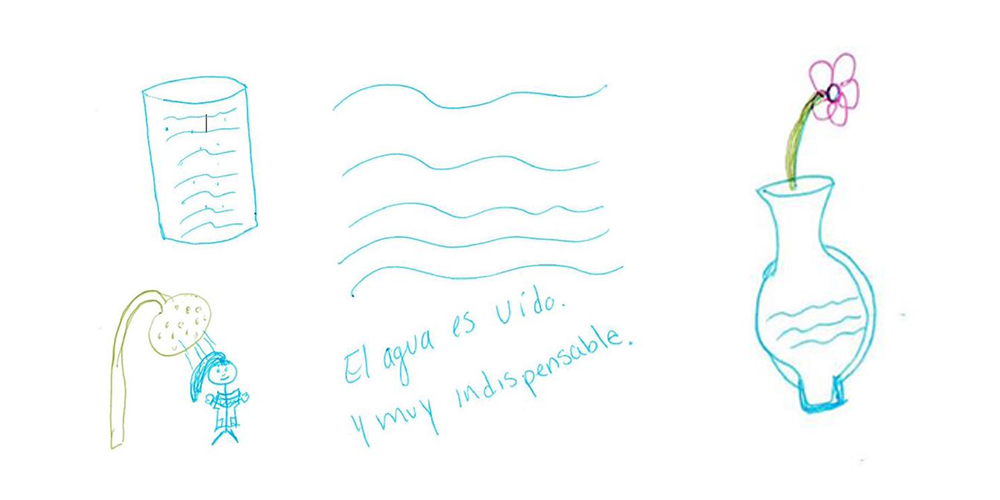Tap water trust and its consequences in the San Joaquin Valley
As an icebreaker, focus group members were asked to draw their vision of water.
The goal of California’s Human Right to Water is access to clean, safe, and affordable drinking water for every Californian. While most water systems across the state provide clean and safe water, there are about a million people across the state for whom that is not true. Millions more Californians do not trust that their water is safe to drink, leaving them to rely on more expensive and less healthy alternatives.
New research funded by the Chicano Studies Research Center and being led by Human Right to Water Solutions Lab team members Silvia R. González, director of research at UCLA Latino Policy and Politics Initiative and Ariana Hernandez, a Luskin Master of Urban and Regional Planning student, and advised by Greg Pierce, and Human Right to Water Solutions Lab Collaborator Hector Gutierrez, the Strategic Initiatives Specialist at First 5 Kern, aims to better explain factors that influence trust of tap water in the Latinx communities in particular, explore tradeoffs in drink choice and affordability burdens, and motivate publicly funded solutions. The research team held two focus groups followed by a survey with Latinx community members and First 5 participants in the San Joaquin Valley, where tap drinking water quality is particularly compromised and reliance on bottled water and sugar-sweetened beverages is high.
Focus group members reported that they…
Distrust tap water because:
- They personally have experienced or know someone who has developed rashes or irritation from using tap water.
- They know the tap water meets regulatory standards but distrust the age and condition of the pipes in their homes.
- They distrust the water company when they provide water testing because they feel that their motives are revenue collection, not improving water quality.
- The information the water company provides is confusing and leads them to distrust the water company further.
“If a test proved that my water was good for drinking and I don’t trust the water companies, of course they’re going to tell us the water is good to drink. They’ve told us for years that the water is good to drink up here.
When I have hoses that have this collective gunk in it, I’m not putting that in my mouth, that’s disgusting. They’re all about the bottom line and the money. There’s no honesty anymore so I wouldn’t believe them if they said that. I’d like a filter.”
– Focus Group Member
Literally pay a premium to find water they trust:
- Some residents pay up to $100 a month on alternative sources for drinking water.
- They face a “triple penalty”
- High water bill cost despite low water quality,
- Cost to buy alternative water sources,
- Associated health costs with drinking or bathing in unsafe water.
- Residents who lived in rural areas of Kern County expressed frustration in having to travel to buy their alternative water sources as gas prices have become more expensive.
Needed solutions to water quality issues:
- Offer bottled water delivery to reduce the burden of buying bottled water and the associated costs of traveling to purchase it.
- New plumbing infrastructure would increase their trust in tap water.
- Introduce a trusted third-party to perform water quality testing.
- Many were weary of taxes on sugary beverages because they feel it is regressive and the responsibility of their water provider or local government to provide clean water. They also expressed doubt that tax revenue would be used to benefit their community.
“If Calwater came to me and left me three or four or five cases of water in my driveway once a month and handed me a bill for $125 I might not be as irritated, you know what I mean?”
-Focus Group Member
A full report, incorporating survey results and sharing our research instruments, is coming soon.
In the meantime, you can read about additional Human Right to Water Solutions Lab research about tap water trust in this journal article and report.
Contact us if you’re interested in joining the Premise Plumbing Working Group, where advocates, researchers, industry professionals and government employees meet to collaborate on solutions to tap water trust in California.
Acknowledgements: The research was made possible with the support from the UCLA Institute of American Cultures, the UCLA Chicano Studies Research Center, the UCLA Luskin Center for Innovation and the UCLA Latino Policy and Politics Institute.








